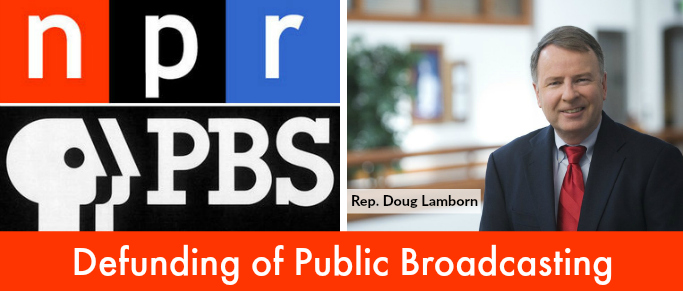Penna Dexter
As the Trump Administration considers cutting funding of public broadcasting — NPR and PBS – one state governor is ready to zero it out.
Jim Justice is Governor of West Virginia. His 2018 budget cuts funding for WVPB, West Virginia Public Broadcasting, from where it is now, $4.6 million, down to zero. The Daily Signal reports that West Virginia currently has a $500 million shortfall. Well, the money has to come from somewhere. States don’t carry deficits from year to year like the federal government does. In West Virginia, there will be cuts to other programs as well as new tax hikes to get things balanced.
The state of West Virginia funds almost half of WVBP’s $10 million budget. The organization’s chairs issued a statement pointing out that (quote) “such a drastic and immediate cut threatens the very existence of our state’s PBS and NPR stations.”
We have to ask ourselves why taxpayers, at the state and federal levels, should have to fund public radio and television, both of which air content that is predominantly liberal. If NPR and PBS went away tomorrow, there would still be plenty of media for the American taxpayer to consume. There are so many choices, it’s nonsensical to insist certain parts of the country won’t get good programming if the government doesn’t fund it. If the programming provided by the Corporation for Public Broadcasting is so necessary and popular, NPR and PBS should be able to raise the money needed to support it.
On a federal level, the Corporation for Public Broadcasting receives taxpayer funding to the tune of $445 million per year. The president is considering privatizing it – just selling it off. That’s a great idea.
Rep. Doug Lamborn of Colorado has actually introduced two bills to permanently defund the Corporation for Public Broadcasting and National Public Radio.
The conservative think tank, Heritage Foundation says it’s about time. Mike Gonzalez is Senior Fellow there and he says, “Whether it’s state or federal, all taxpayers shouldn’t be expected to fund such marked bias. It’s unfair and unwise,” he says, “to fund any media organization that ignores the philosophy and arguments of one-half of the country.”
He thinks NPR and PBS would do just fine as private non-profits using their membership model for raising money. If the programs people love are really that great and that popular, they will draw in the needed funds. One conservative who appreciates some of PBS and NPR’s programming said, “I would actually start giving them money if they’d stop taking it from me.”
The Corporation for Public Broadcasting could shed its non-profit status, start selling ads, and rake in millions. Big Bird will be just fine.
In a free society, we certainly don’t need government-supported media outlets, especially when they provide political news and commentary. The proposed defunding of public broadcasting should be part of a nationwide effort to defund the Left.
 Listen Online
Listen Online Watch Online
Watch Online Find a Station in Your Area
Find a Station in Your Area









 Listen Now
Listen Now Watch Online
Watch Online
